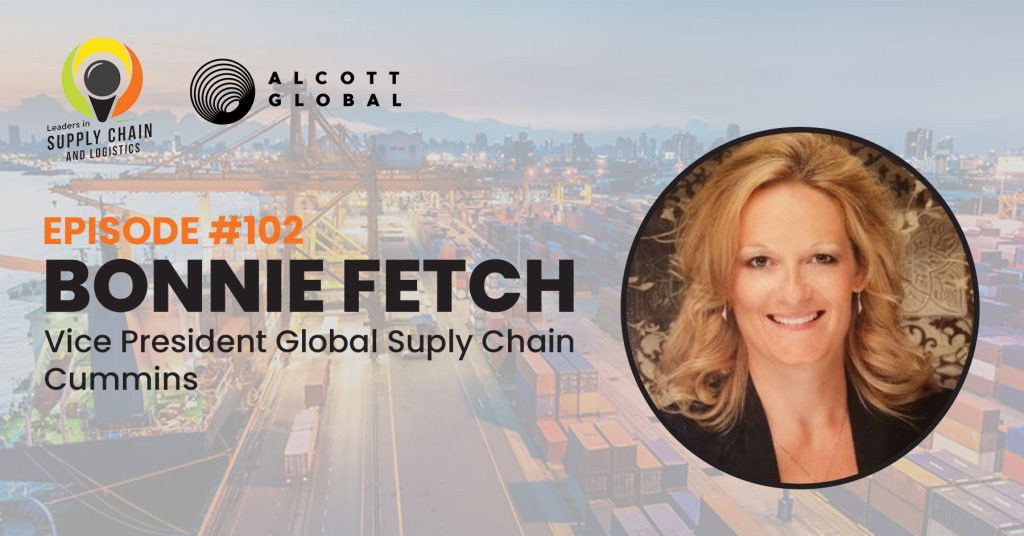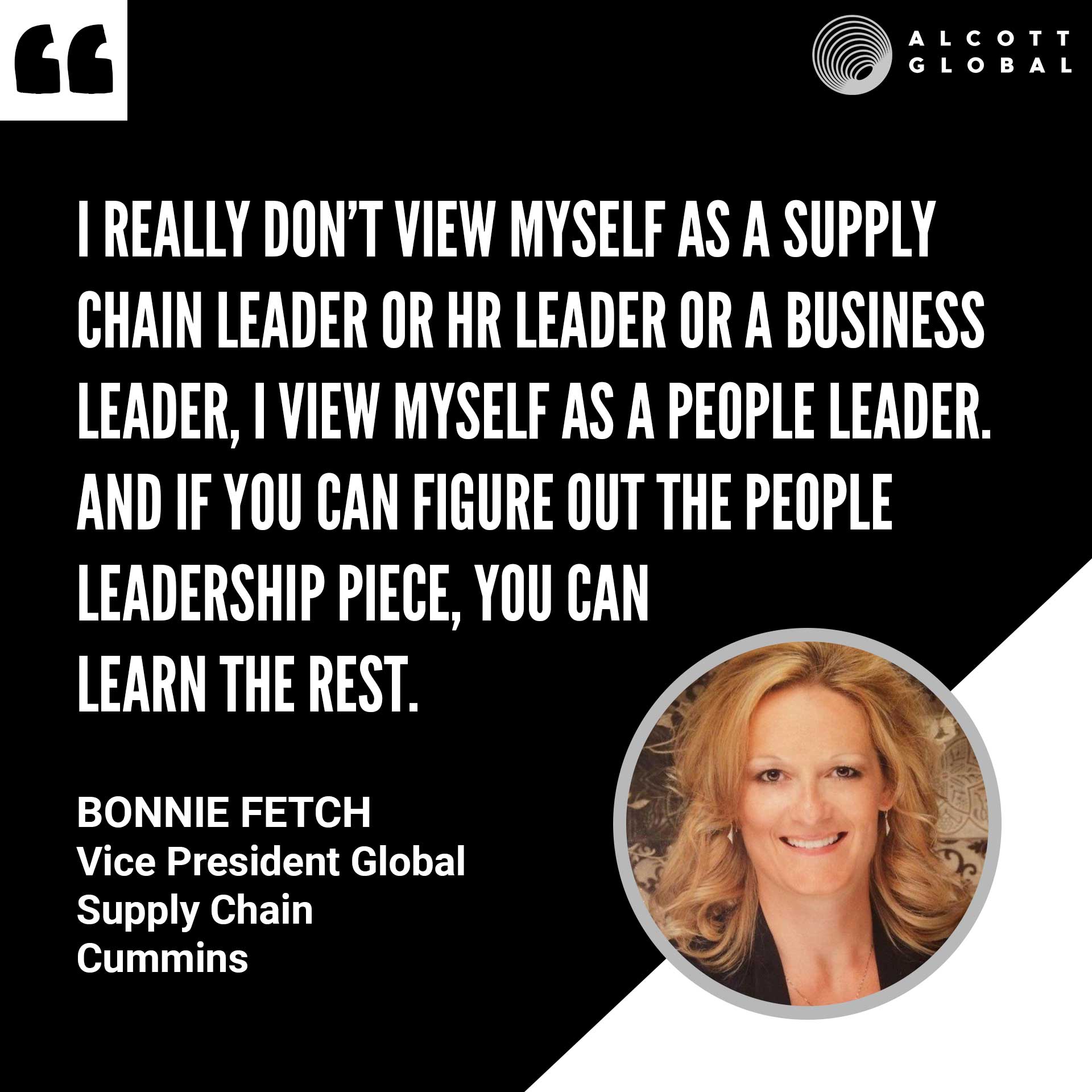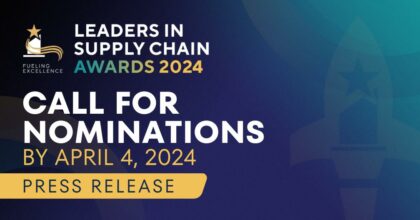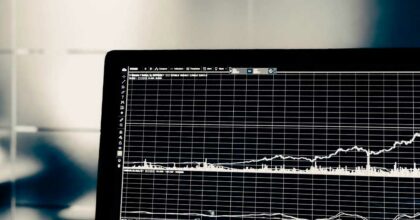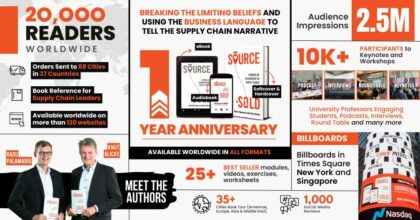Bonnie Fetch is currently the Vice President Supply Chain at Cummins Inc. Cummins Inc. is a corporation of complementary business units that design, engineer, manufacture, distribute, and service engines and related technologies, including fuel systems, controls, air handling, filtration, emission solutions, and electrical power generation systems.
Bonnie is in-charge in leading the Global Supply Chain for Cummins’ distribution business segment and leading company-wide Supply Chain transformation for Cummins with the responsibility to implement Supply Chain Services operations globally and significantly improving the efficiency and effectiveness of supply chain processes.
Listen to the full discussion here:
Connect with the Guest:
Bonnie Fetch: LinkedIn
Some of the highlights from the podcast:
- Bonnie’s journey from running her own business to becoming HR head and then transitioning as running the PnL of a 400 million business
- How Bonnie learned about engines and transmission gear from her dad
- Importance of Data Analytics to gain insights to predict and forecast
- Automation, Robotics, and Scalability during the pandemic
- Key reasons to maneuver a different career path
- How to encourage more diversity and why Bonnie wrote a book on this
Show notes:
- [1:23] I wanted to ask you, first and foremost, to tell us a little bit about your career, because it’s quite unusual. Maybe walk us through a little bit of what led you to where you are today in life.
- [1:37] Certainly non-traditional, not a career path that I could have mapped out 30 years ago, as you mentioned, I started my career in hospitality. And mostly that was because my father and grandfather were both in the industrial side of the world.
- [4:25] Yeah, there’s quite a bit of both, and I guess this year has kind of things upside down. COVID-19 and all the disruption that has taken place and is still taking place this year affected you and if there was some, you know, case studies and changes that you’ve made in your supply chain better.
- [4:45] 2020 has certainly been a year that none of us were prepared for. It actually reminds me of my early days in logistics when I used to say you know, one year of experience in the logistics business gives you 10 years of experience because there is always something happening and lots of chaos in the logistics world back then.
- [6:54] The challenge is real in the supply chain, we tend to lead and lag in terms of impact to the business overall. And we do believe that our challenges will remain for the next number of months, not only from the concerning COVID spread that we’re seeing, some period of time before the vaccine actually makes an impact.
- [7:41] How has that affected your diet? Have you moved some production around? Have you brought it closer to the market? How’s the situation without becoming as in general, and how do you see it playing out in the longer term?
- [8:05] COVID restrictions, the lockdowns, the foreclosures have created some challenges, in the end, and Mexico to name a couple. But I think that what the COVID pandemic has reinforced is the shift from 10 years ago was all about a global network sourcing, products from the lowest-cost countries. I think the next decade is going to be how do you regionalize your supply chain,
- [10:00] Do you think, you know, we’ll continue to evaluate the footprint and our agility to be able to respond to these kinds of supply chain disruptions moving forward?
- [10:42] We’re seeing extended logistics times, right. The question is, you know, how much of this is the significant balance from q3 and settle down? And how much of this is here to stay for some period of time? I don’t think we fully know that yet. But definitely the logistics side of the business. Is that a real challenge for us right now?
- [11:27] It’s significant. Other trades that are underutilized today is a complete discrepancy that seems this way works at the moment.
- [11:39] They put a lot about IoT, and machine learning and automation, robotics, and so on. I wanted to come in as one more case study that you are you implemented with the results? Maybe you can give some examples?
- [12:06] We’re certainly talking about implementing, collaborative robots, 3d printing, not only for prototyping, but also for low volume legacy parts in the aftermarket, even drone technology, right, big data and analytics, and predictive logistics, which all were quite exciting and continue to evolve.
- [17:22] I just think about our ability in this industry in the industrial side of the business to keep mining machines running 100% of the time. And the only way that we can do that is to get more predictive today. We also do so with a pretty heavy cost of expediting when we have an urgent situation that we didn’t necessarily plan for.
- [19:31] When they are in supply chain logistics is a global level skill. Looking back on the speeches and the skills that I also feel today with flexibility, the ability, right, those will enable you to make the move in your career.
- [21:06] I’m a continual learner, one of my top five strengths from strengthsfinder is a learner. And so I’m always curious, and I’m willing to take risks, that probably is the key reason why I’ve been able to maneuver this very strange career path is my willingness to take risks and my curiosity. So you know, when I think about, you know, some of my,
- [22:05] I knew nothing about transmissions when I went running a business. And in fact, I told him, I don’t think I’m the best-qualified person for this job. And the more you do that, if you’re adaptable, leadership, and going into different functions and different roles is really about learning and then applying, cross-functional or transferable skills, we like to call them soft skills, I like to call them harder skills, because they’re, in many ways, a harder to find than, than hard skills.
- [24:08] That’s always the fastest, sometimes only if you don’t drown. It’s the fastest. So I’ll just put, I just put this one because you might like, seeing the testimony that Daniel is saying about you. So I think you definitely have, but at least one big fan. I think there’s one big thing.
- [24:30] I’ve often answered that question like how did you go from working in restaurants, running restaurants to a travel agency to now you’re working in an industrial world and, you know, the bottom line is, we’re all in as leaders, we’re all in the people business. If you’ve got a clear vision, people are developed to be able to do their job. And you got to get out of the way and let’s do it
- [25:34] Was it and on the diversity of the diversity aspect, and I know that you wrote a book. Maybe Tell us about your thoughts around, you know, diversity in the workplace. Also, there are not so many women like there are not so many women in manufacturing, still in leadership positions.
- [26:15] I didn’t grow up wanting to be an author. I had no idea about writing a book, probably if I knew, before writing the book, how much time and effort it would take, I don’t know if I would have started to be honest. But the way it came about, I have had a successful career. And I never wanted to associate myself with the term feminism, like a lot of women don’t, right, I would never have introduced myself as a feminist.
- [29:12] When I first started speaking out about it was uncomfortable that people would think I was trying to advocate for myself or my own benefit. But I, around the same time, first grandchild and chose a girl and, you know, had some things happening in life that, you know, kind of were turning point, moments for me, and I just decided, I’m going to make a difference.
- [34:07] Thanks for the authentic sharing. And yeah, interesting. I mean, I have to add my two cents. I had a similar aha moment. Like I never thought okay, I’m a guy. I didn’t realize that also from a victim, it can happen that you share that you also realize that it’s kind of lonely at some point.
- [34:41] I had so many experiences of going into lead organizations, I acknowledge that there are in almost every leadership role into people in the organization that know the work better than I do.
- [35:56] I had imposter syndrome for, you know, at least three months, if not longer, where I thought, you know, they’re gonna figure out that if they scratch too deep below the surface, I do not know what I’m talking about, relative to the gear ratio, and in, you know, all things transmission.
- [36:20]So what I did, when I found out, I was going into that role, leveraging, my learning agility, I called my dad and told them, number one, I was moving out of the country. And number two that I was coming, visit him that next weekend, and I needed him to teach me everything that I needed to know about transmissions.
- [38:57] The honor, just a couple more questions, coming back a little bit on some examples, right, the way you’ve seen this kind of pipeline grooming done, right, specifically on the topic of diversity, whether it’s, you know, a group, more female leaders, and you know, the diversity that you have raised, you have a couple of other things, age groups, and so on. Can you give us some examples of where you’ve seen it from your experience
- [39:56] I would say is, rather than jumping right to grooming, you know, women for leadership roles, I think we have to acknowledge that there are capable women already in the workplace. I have been in throughout my career, and many, many times, I’ve been the first female leader at an executive level in your first female leader for this, that and the other thing isn’t that I was the first capable woman.
Quote from the Episode:
About the Host:
The host, Radu Palamariu is the co-author of “From Source to Sold – Stories of Leadership in Supply Chain”. He has been named one of the top 3 Global Supply Chain Influencers on LinkedIn and was featured in Forbes, Bloomberg, WEF, Bangkok Post, and MIT Supply Chain Talent magazine. Radu invites executives to share stories and perspectives around technology, logistics, e-commerce, supply chain, and manufacturing, and their views on how the future will look.
Alcott Global connects and upgrades the supply chain ecosystem by finding the right talent through executive search, developing talent through learning solutions, and meeting supply chain technology needs through a comprehensive crunch base marketplace.
The supply chain executive search has been our focus since the very beginning, offering recruitment services for top-tier supply chain roles at every level of the end-to-end supply chain: plan, source / procure, make, and deliver. Our consultants have years of experience in placing top talent, in North America, LATAM, Europe, the Middle East & Africa, and APAC, and besides speed, one of our biggest strengths is our network within the supply chain industry, and we capitalize on it to find the best solutions.
Through the years, we have grown as an organization and our offerings with it. One of our initiatives, the learning solutions- training and supply chain academy, is focused on transforming leadership- self-leadership, executive presence, influence capital, and business acumen. Through Supplify, we aim to match corporations with the top technology companies to solve their supply chain and logistics challenges with a focus on innovation and digital transformation.
We are in constant touch with the leaders in supply chain, inviting them to inspire the supply chain professionals in thought-provoking podcast episodes and events, and showcasing what is possible at the yearly Leaders in Supply Chain Awards.
Related Episodes:
#99: Francisco Betti Head of Advanced Manufacturing and Production at World Economic Forum
#100: Pier Luigi Sigismondi President at Dole Packaged Foods
#101: Kara Goldin Founder & CEO of Hint

